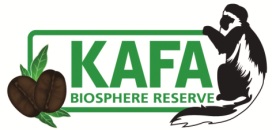EXPLORE » WILD COFFEE » FOREST COFFEE COLLECTION IN KAFA
FOREST COFFEE COLLECTION IN KAFA
Ethiopians highly value Arabica coffee for both traditional and economic uses. They collect coffee for personal use and sell it at local markets. Coffee collection can significantly improve the people’s livelihood. Over 6,500 farmers have formed cooperatives with support from a German-Ethiopian Public Private Partnership (PPP), through which they can supply more coffee at a similar quality and of the same variety than they could as individual farmers.

Wild coffee plants flower in February and then bear soft red fruits called cherries that contain two hard green coffee beans. The farmers collect the coffee berries in the wild forests. They choose only the red ripe berries, which provide the best quality.
To start traditional fermentation, the farmers dry the coffee fruits on ventilated open-air frames, producing a “sun-dried coffee”. The dried fruits are then transported to dehulling stations, where they are milled to obtain the raw green coffee beans. The beans are then ready to be selected and transported for quality testing to Ethiopia’s capital.
 Quality control ensures that each product is of a similar quality and of a certain standard for export. Monitors at special collecting points check the quality of the beans that the farmers supply. Governmental quality controllers roast and test a sample from each batch of coffee that leaves Ethiopia. From the quality control centre in Addis Ababa the unroasted coffee is transported to the port of Djibouti for export. The companies selling the coffee abroad have obtained organic certification and Fair-trade labels for the wild coffee adding to its profitability and increasing demand for the farmers.
Quality control ensures that each product is of a similar quality and of a certain standard for export. Monitors at special collecting points check the quality of the beans that the farmers supply. Governmental quality controllers roast and test a sample from each batch of coffee that leaves Ethiopia. From the quality control centre in Addis Ababa the unroasted coffee is transported to the port of Djibouti for export. The companies selling the coffee abroad have obtained organic certification and Fair-trade labels for the wild coffee adding to its profitability and increasing demand for the farmers.
